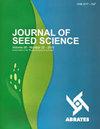Effect of chemical treatment on the physiological and sanitary quality of stored coffee seeds
IF 1.2
4区 农林科学
Q3 AGRONOMY
引用次数: 0
Abstract
Abstract: Maintaining the health of coffee seeds is especially important during storage, as soil fungi and storage fungi can considerably reduce seed quality. Thus, chemical treatments for protection of seeds in storage becomes important in agricultural production. It is necessary to evaluate the effects of these treatments on seedling development and the protection they provide against storage fungi, aiming at seed longevity and preventing rapid deterioration. The aim of this study was to evaluate the effect of chemical treatment on the physiological and sanitary quality of stored coffee seeds. Seeds of five Coffea arabica cultivars were pre-dried, treated with Vitavax®-Thiram, and placed in cold storage at 10 °C for nine months. Seed physiological quality was evaluated every three months by the germination test and by determination of root emergence percentage, seedlings with expanded cotyledonary leaves, and seedling dry matter. Seed health quality was assessed by the health test. The chemical treatment with Vitavax-Thiram does not affect the physiological quality of stored Coffea arabica seeds. Seed treatment before storage is effective in reducing the inoculum potential of Fusarium spp. and Phoma spp. in coffee seeds.化学处理对贮藏咖啡种子生理卫生品质的影响
摘要:咖啡种子在贮藏过程中,由于土壤真菌和贮藏真菌会显著降低种子质量,因此保持种子的健康尤为重要。因此,化学处理对贮藏种子的保护在农业生产中具有重要意义。有必要评估这些处理对幼苗发育的影响及其对贮藏真菌的保护作用,以延长种子寿命和防止种子快速变质。本研究的目的是评价化学处理对贮藏咖啡种子生理和卫生品质的影响。五个阿拉比卡咖啡品种的种子被预先干燥,用Vitavax®-Thiram处理,并在10°C冷藏9个月。每3个月通过发芽率测定、根系出苗率测定、子叶膨大苗率测定、幼苗干物质测定等方法评价种子生理品质。采用健康试验评价种子的健康质量。Vitavax-Thiram化学处理不影响储存的阿拉比卡咖啡种子的生理品质。种子储藏前处理能有效降低咖啡种子中镰刀菌和镰刀菌的接种势。
本文章由计算机程序翻译,如有差异,请以英文原文为准。
求助全文
约1分钟内获得全文
求助全文
来源期刊

Journal of Seed Science
Agricultural and Biological Sciences-Agronomy and Crop Science
CiteScore
2.00
自引率
30.00%
发文量
28
审稿时长
12 weeks
期刊介绍:
From 2017 the Journal of Seed Science (JSS) will circulate online version only.
Original scientific studies and communications, not yet published or submitted to another journal for publication and written in Portuguese or English, will be accepted for publication. For manuscripts submitted in English, the authors should provide an adequated version.
The SCIENTIFIC COMMUNICATION is a category of scientific manuscript which describes a technique, an equipment, new species or observations and surveys of limited results. It has the same scientific rigor as the “Scientific Articles” and the same value as a publication. The classification of a manuscript as a SCIENTIFIC COMMUNICATION is based on its content and scientific merit but it can be a preliminary study, simple and not definitive on a certain subject, with publication justified by its uniqueness and contribution to the area.
The Editorial Board of the JSS may invite leading authors of recognized reputation to compose specific Review Articles covering topics of their specialization that will convey to the scientific community the state-of-the-art knowledge related to the specific theme.
 求助内容:
求助内容: 应助结果提醒方式:
应助结果提醒方式:


